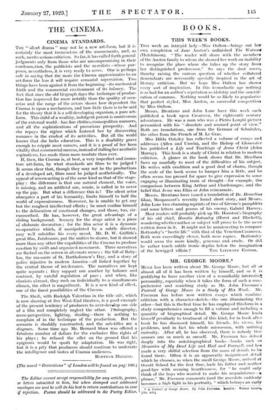THE CINEMA.
CINEMA STANDARDS.
TIIE " silent drama " may not be a new art-form, but it is certainly the most tremendous of the amusements, and, as such, merits serious criticism. So far, it has called forth general judgments only from those who are uncompromising in their condemnation, the publicists and the moralists—whose pur- poses, nevertheless, it is very ready to serve. One is perhaps safe in saying that the more the Cinema approximates to an art-form the less it will require censorial supervision. Two things have been against it from the beginning—its mechanical birth and the commercial environment of its infancy. The fact that since the old biograph days the technique of produc- tion has improved far more notably than the quality of scen- arios and the range of the actors shows how dependent the Cinema is upon a mechanism, and how little there is to be said for the theory that it is a self-developing organism, a pure art- form. This child of a wealthy, indulgent parent is omnivorous of the external world--has fine clothes, cosmopolitan manners, and all the sophistications of precocious prosperity. And she repays the regime which fostered her by discovering romance in the crudest of its activities. But all the world knows that she lacks education. This is a disability grave enough to cripple most careers, and it is a proof of her keen vitality that commercial success, instead of dulling her aesthetic aspirations, has made them more resolute than ever.
If, then, the Cinema is, at best, a very imperfect and imma- ture art-form, by what standards are films to be judged ? It seems clear that, though they may not be the productions of .a developed art, films must be judged aesthetically. The appeal of screen-acting is of the same kind as that of the stage- play : the difference is that one natural element, the voice, is missing, and an artificial one, music, is called in to cover up the gap. But what a difference this is 1 The silent actor abnegates a part of his humanity, limits himself to half the world of expressiveness. Moreover, he is unable to get any but the roughest intellectual effects ; he must confine himself to the delineation of emotional changes, and those, too, cir- cumscribed. He has, however, the great advantage of a sliding background. Scenery for the stage artist is a piece of obdurate decoration ; for the film actor it is a dynamic co-operative which, if manipulated by a subtle director, may well subsidize his every mood. Mr. D. W. Griffith's great film, Intolerance, put the unities to shame, but it showed more than any other the capabilities of the Cinema to produce emotion by swift and organized movement. Three narratives are flashed on the screen in alternate scenes : the fall of Baby- lon, the massacre of St. Bartholomew's Day, and a story of police injustice in modern America—all linked together by the central theme of intolerance. The narratives are kept quite separate ; they support one another by balance and contrast, by careful regulation of pace ; and when, like chariots abreast, they rush on individually to a simultaneous climax, the effect is magnificent. It is a new kind of effect, one of the finest possibilities of the Cinema.
The Sheik, with Rodolph Valentino in the title role, which is now showing at five West-End theatres, is a good example of the present tendency of producers to over-develop one side of a film and completely neglect the other. Photography, scene-perspective, lighting, shading—there is nothing to complain of in the technique of the production. But the scenario is shoddily constructed, and the sub-titles arc a disgrace. Some time ago Mr. Bernard Shaw was offered a fabulous number of dollars for the exclusive film rights of his plays ; he refused the offer on the ground that his epigrams would be spoilt by adaptation. He was right, but it is a pity that producers should continue to underrate the intelligence and tastes of Cinema audiences.
BERTRAM HIGGINS.
(The usual " Recreations" of London will be found on page 160.)










































 Previous page
Previous page